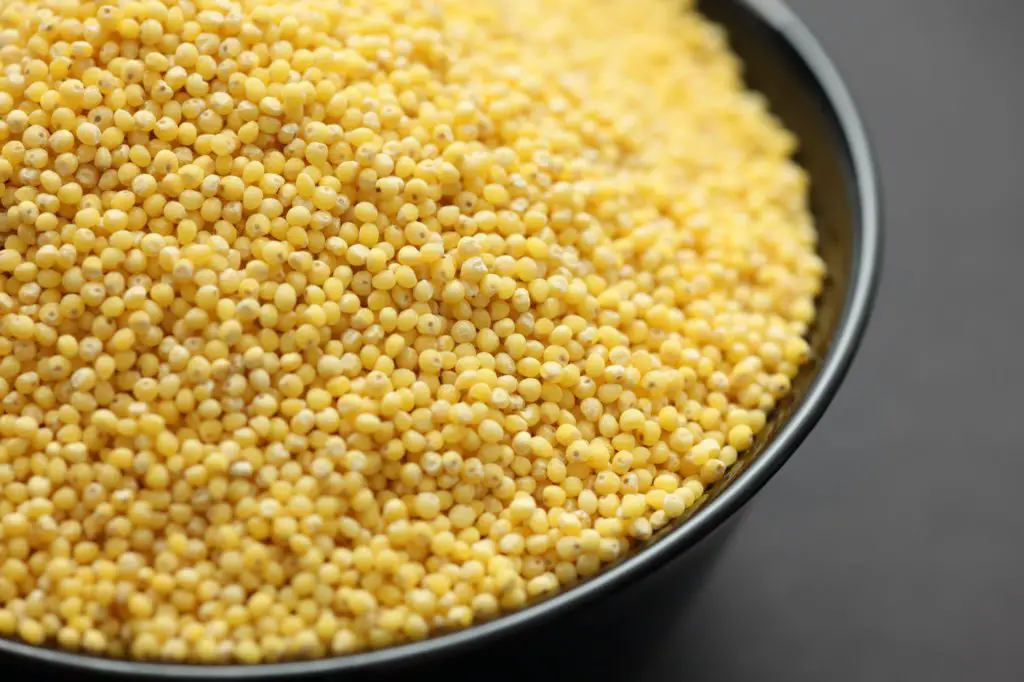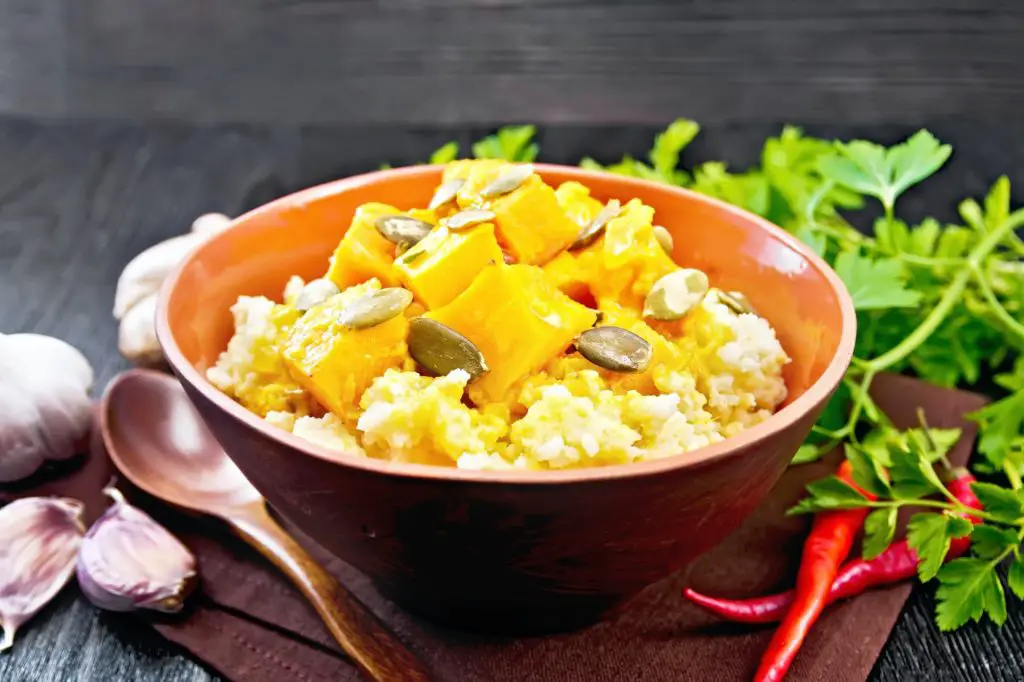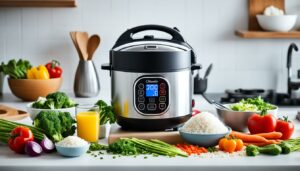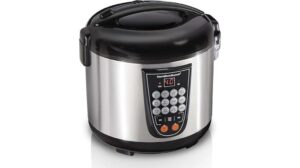As you already know, a rice cooker is a great appliance to have in your kitchen if you are looking for an easy way to cook up some of your favorite dishes. Millet is one of those grains that may not be as popular as other types, but it has many benefits. It’s also very versatile, so it can be used in many different types of recipes. In this blog post, we will walk you through how to cook millet in a rice cooker and ensure perfect results every time.
Table of Contents
What Is Millet?

Millet is a grain that comes from the grass family, and it has been used for cooking for thousands of years. It’s gluten-free, so people with celiac or other wheat sensitivities can enjoy millet without any trouble. This makes it an excellent addition to many types of dishes where you want to replace pasta noodles or rice grains.
Why Should You Eat Millet?
Millet is a great alternative for people who are sensitive to other grains like wheat or gluten. It contains all of the essential amino acids and vitamins that you need, so it will provide your body with lasting energy throughout the day. Millet also has a much lower glycemic index than rice which means you can eat more at one time without experiencing the bloating, gas, and sluggish feeling that you can get from other foods.
How to Cook Millet in a Rice Cooker?
Cooking millet is as easy as cooking rice, but there are some different guidelines for how much water or liquid you should use. You will want to add twice the amount of liquid than the weight of your grain. Here are the 6 simple steps that I use to cook millet in a rice cooker – and get perfect results every time.
1. Add 1 cup of millet to a rice cooker
2. Fill the pot with water – I usually add about 2 cups of water for every 1 cup of millet and let it cook in the rice cooker for about 20 minutes, or until cooked through but not mushy
3. Turn off the power when the millet is done cooking, or if you want to make some more later on
4. Eat your cooked millet as a side dish or as an ingredient in other recipes like oatmeal, porridge, pilafs, salads etc.
5. To make this recipe vegan-friendly substitute vegetable broth for water and add coconut oil instead of butter; omit salt from the recipe and use soy sauce instead of fish sauce
6. Enjoy!
So, that’s it. As you can see it’s really very simple to cook millet in a rice cooker – and get perfect results every time.
What’s The Best Rice Cooker For Cooking Millet?
As you know, there are many versatile rice cookers on the market, but how do you know which one is the best for cooking millet?
Well, in my option, some of the best ones, are Panasonic’s rice cookers, and I’ll explain why.
The first thing I want to mention is that many of the top-selling rice cookers on Amazon right now are all made by Panasonic. If you have read any reviews online, they seem pretty favorable as well (especially when it comes to customer service). So this brand is an excellent choice in my opinion!
Here is what customers had to say about their experience using Panasonic Rice Cookers:
“I am so happy that I found this Panasonic rice cooker. It cooks quickly, efficiently and the results are very consistent.”
“This rice cooker is easy to use, has an excellent variety of settings and it does a great job.”
Another thing I like about Panasonic’s cookers is how easy they are to clean. One customer said that their Panasonic rice cooker was “so quick and simple to clean”. That sounds really good if you ask me!
I also found some reviews on Amazon where people were saying things like this: “It cooks a range of foods like brown rice, quinoa and millet perfectly for us!”
In terms of the price point – this brand offers a range of different models from $79-$169 (with a few variations in between) so there should be something affordable for everyone. They also offer free shipping with no obligation or contract required which might come in handy when looking for a reliable rice cooker that is suitable for general, everyday use.
Here are my top 3 rice cookers for cooking millet.
Best High End Model
- JAPANESE RICE COOKER – Industry leading induction heating which creates an electrical current inside the pot to heat and cook rice, porridge, soup and more
Prices pulled from the Amazon Product Advertising API on:
Product prices and availability are accurate as of the date/time indicated and are subject to change. Any price and availability information displayed on [relevant Amazon Site(s), as applicable] at the time of purchase will apply to the purchase of this product.
Best Mid Range Model
- JAPANESE-STYLE RICE COOKER* – Industry leading induction cooking which creates an electrical current inside the pot to heat and cook rice, porridge, soup and more
Prices pulled from the Amazon Product Advertising API on:
Product prices and availability are accurate as of the date/time indicated and are subject to change. Any price and availability information displayed on [relevant Amazon Site(s), as applicable] at the time of purchase will apply to the purchase of this product.
Best Commercial Grade Model
- Commercial standards - our arc-1130s is part of our Commercial rice cooker Line, allowing for restaurant quality Rice to be prepared on a commercial level.
Prices pulled from the Amazon Product Advertising API on:
Product prices and availability are accurate as of the date/time indicated and are subject to change. Any price and availability information displayed on [relevant Amazon Site(s), as applicable] at the time of purchase will apply to the purchase of this product.
Some FAQs
What is the ratio of water to millet in a rice cooker?
Does millet need to be soaked before cooking?
One common question about cooking millet is whether or not it needs to be soaked before cooking. The answer is that it depends on the recipe you’re making. If you’re adding millet to a soup or stew, there’s no need to soak it first; simply add it to the pot along with the other ingredients and cook until tender. However, if you’re cooking millet as a standalone dish, such as porridge or pilaf, it’s best to soak the grain in water for at least 30 minutes before cooking. This will help to soften the grain and prevent it from becoming overcooked or mushy. Soaking millet is also a good way to reduce the cooking time; for most recipes, soaked millet will be finished in 20-30 minutes, while unsoaked millet can take up to an hour to cook through.
Can millet cause constipation?
Millet is high in fiber, which can help to regulate digestion and prevent constipation. However, if it is not cooked properly, millet can actually cause constipation. When cooking millet in a rice cooker, it is important to add enough water so that the grain can absorb all of the water and soften properly. If the millet is too dry, it will be difficult to digest and may cause constipation. In addition, it is important to cook the millet for the appropriate amount of time. If it is overcooked, it will become mushy and difficult to digest. Therefore, it is important to follow the instructions on how to cook millet in a rice cooker so that you can avoid constipation.

Does millet increase blood pressure?
Some studies have suggested that millet may help to lower blood pressure, but more research is needed to confirm this. If you are considering adding millet to your diet, talk to your doctor first to make sure it is safe for you.
Does millet cause thyroid problems?
Though millet is a staple in many diets, some people worry that it may cause thyroid problems. However, there is no evidence to support this claim. Millet is a nutrient-rich grain that has been shown to actually improve thyroid function. In addition, millet is easy to cook and can be enjoyed in a variety of dishes. To cook millet in a rice cooker, simply add the grain to the pot along with water or broth. Then, set the cooker to the “rice” setting and allow the millet to simmer until it is tender. Once cooked, millet can be enjoyed on its own or used as a base for other dishes. So, there is no need to worry about thyroid problems when enjoying this delicious grain.
Which millet is closest to rice?
There are many types of millet, and each has its own flavor and texture. However, some varieties are more similar to rice than others. For example, proso millet is small and round, with a tender texture that is similar to that of sushi rice. Foxtail millet is another variety that is often used in Asian cuisine. It has a nutty flavor and a slightly chewy texture that is reminiscent of brown rice. If you’re looking for a millet that is closest to rice in terms of flavor and texture, either of these two varieties would be a good choice. To cook either type of millet in a rice cooker, simply rinse the grain thoroughly and then add it to the cooker in the same ratio as you would use for rice. Cook according to your cooker’s instructions, and enjoy!

Is millet a carb or protein?
Millet is high in carbohydrates and proteins, making it a healthy and filling food. It is also gluten-free, making it a good choice for people with celiac disease or gluten sensitivities. With its nutty flavor and versatile texture, millet is a great grain to keep on hand for quick and easy meals.
Does millet spike blood sugar?
One common concern about millet is its effect on blood sugar levels. Millet does contain carbohydrates, but it also has a low glycemic index, meaning that it is slowly absorbed by the body and does not cause a sudden spike in blood sugar levels. Additionally, millet is high in fiber, which further helps to regulate blood sugar levels. For those who are concerned about blood sugar spikes, cooking millet in a rice cooker is a good option. The rice cooker will evenly cook the grain, resulting in a fluffy and light final product. With its low glycemic index and high fiber content, millet is a good option for those looking to maintain stable blood sugar levels.
Which is better oats or millet?
Oats or millet? This is a question that has been debated for centuries. There are pros and cons to both grains, and it ultimately comes down to personal preference. That said, there are some key differences between oats and millet that may sway your decision. For instance, millet is a more versatile grain than oats. It can be cooked in a variety of ways, including in a rice cooker. Additionally, millet is a good source of magnesium and phosphorus, whereas oats are higher in fiber. Ultimately, the best grain for you is the one that meets your individual needs and preferences. Try both oats and millet to see which one you like best!
Conclusion
I hope you have enjoyed this short article. As always, if you have any questions please reach out to me or leave a comment and if you would like to get other tips such as how to cook lentils in a rice cooker, how to cook oats in a rice cooker or how to cook pasta in a rice cooker, to name but a few then please read my other posts. Happy cooking!








